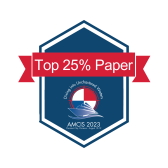Loading...
Paper Type
Complete
Description
Disasters and crises are a part of human existence. While upsetting the normal operations of societies and revealing the inherent fragility of infrastructure and social order, they also push us to rethink “the normal” way of living and working. At this moment, IS research on the experiences of businesses in times of war as an extreme crisis is very limited. Taking the case of Ukrainian businesses, we ask the following research questions: How have organizations adapted to war discontinuities and built resilience? and How have the experiences of remote work from the pandemic contributed to building organizational resilience in times of war? Analyzing semi-structured interviews with managers from Ukrainian businesses through the lenses of adaptation theory, remote work discontinuities, and capability-based model of organizational resilience, we present the types of discontinuities experienced and the adaptation strategies used by the companies in addressing them. Our findings show that the resilience of Ukrainian companies has its roots in agile management, continuous communication and collaboration, experiences in using digital technologies during the pandemic, and international community support. The results also indicate the organizations continuously coping and adapting, re-coping, and re-adapting while anticipating unexpected events, which calls for developing a more dynamic resilience model.
Paper Number
1310
Recommended Citation
Berbyuk Lindström, Nataliya; Razmerita, Liana; and Prokopenko, Serhii, "From the Pandemic to War: The Role of Digital Technologies in Ukrainian Businesses Responding to Discontinuities and Building Resilience" (2023). AMCIS 2023 Proceedings. 5.
https://aisel.aisnet.org/amcis2023/fow/fow/5
From the Pandemic to War: The Role of Digital Technologies in Ukrainian Businesses Responding to Discontinuities and Building Resilience
Disasters and crises are a part of human existence. While upsetting the normal operations of societies and revealing the inherent fragility of infrastructure and social order, they also push us to rethink “the normal” way of living and working. At this moment, IS research on the experiences of businesses in times of war as an extreme crisis is very limited. Taking the case of Ukrainian businesses, we ask the following research questions: How have organizations adapted to war discontinuities and built resilience? and How have the experiences of remote work from the pandemic contributed to building organizational resilience in times of war? Analyzing semi-structured interviews with managers from Ukrainian businesses through the lenses of adaptation theory, remote work discontinuities, and capability-based model of organizational resilience, we present the types of discontinuities experienced and the adaptation strategies used by the companies in addressing them. Our findings show that the resilience of Ukrainian companies has its roots in agile management, continuous communication and collaboration, experiences in using digital technologies during the pandemic, and international community support. The results also indicate the organizations continuously coping and adapting, re-coping, and re-adapting while anticipating unexpected events, which calls for developing a more dynamic resilience model.
When commenting on articles, please be friendly, welcoming, respectful and abide by the AIS eLibrary Discussion Thread Code of Conduct posted here.




Comments
Future